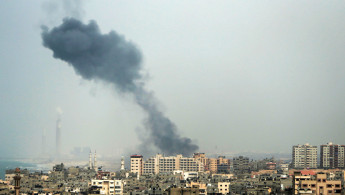Israel shells Hamas posts in besieged Gaza Strip
One round hit an observation post near the border, causing damage but no casualties, a security source from Hamas, the Islamist movement which runs the Gaza Strip, said.
He said that earlier, shortly after sunrise, there were four explosions along the border, which slightly damaged the Israeli frontier barrier.
There was no immediate claim of responsibility for the blasts.
"A number of explosive devices were detonated on the security fence along the northern Gaza Strip. No injuries were reported, an Israeli military statement said.
"Tanks targeted posts belonging to the Hamas terror organisation in response," it added.
On February 17, four Israeli soldiers were wounded by an improvised explosive device on the border, sparking intense military retaliation.
Israel warplanes attacked 18 "targets belonging to Hamas" in Gaza in response to the blast, which severely wounded two of the soldiers, and a subsequent Palestinian rocket attack on southern Israel.
The following day, troops shot dead two Palestinian teenagers near the border, Gaza medical sources said.
The Israeli army said at the time that soldiers fired "warning shots" at a number of Palestinians approaching the border fence "in a suspicious manner" but could not confirm Palestinian casualties.
Days later, Israeli soldiers killed a Palestinian farmer in the bordering Gazan city of Khan Younis.
The Palestinian Health Ministry said the farmer, identified as Mohammed Atta Abdel Mawla, 59, was shot five times by Israeli forces. He was rushed to hospital where his condition deteriorated and he died due to his wounds late afternoon.
A spokesperson for the Israeli army claimed Israeli soldiers shot at Abdel Mawla when he allegedly entered a “forbidden zone" near Gaza's border with Israel.
Israel has maintained a crippling siege of the Gaza Strip for more than a decade which it says is necessary to isolate Hamas, with whom it has fought three wars with since 2008.
Nearly two million people live in Gaza and receive only four hours of electricity a day. Hospitals and other vital services rely on private generators provided by the United Nations, who warn Gaza hospitals are on the "verge of disaster" as fuel for emergency generators run out.
Human rights groups say it amounts to collective punishment of Gaza's residents, with more than half of whom being under the age of 24.





 Follow the Middle East's top stories in English at The New Arab on Google News
Follow the Middle East's top stories in English at The New Arab on Google News
![The UAE is widely suspected of arming the RSF militia [Getty]](/sites/default/files/styles/image_330x185/public/2024-11/GettyImages-472529908.jpg?h=69f2b9d0&itok=Yauw3YTG)
![Netanyahu furiously denounced the ICC [Getty]](/sites/default/files/styles/image_330x185/public/2024-11/GettyImages-2169352575.jpg?h=199d8c1f&itok=-vRiruf5)
![Both Hamas and the Palestinian Authority welcomed the ICC arrest warrants [Getty]](/sites/default/files/styles/image_330x185/public/2024-11/GettyImages-2178351173.jpg?h=199d8c1f&itok=TV858iVg)